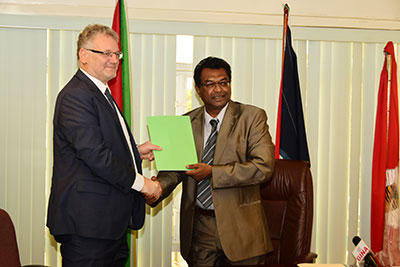…project launched to tackle high-seas drug trafficking
THE Joint Maritime Control Unit (JMCU) and the Maritime Intelligence Unit (MIU) will be made operational next year with a mandate to combat the transnational drug trade and to search vessels suspected of being involved in the trade of illicit substances.

The move was announced on Wednesday following the launch of the Seaport Corporation (SEACOP) Project. The project seeks to improve the capacity of law enforcement agencies in monitoring maritime trafficking, as well as detecting illicit cargo on board vessels. SEAPORT is operational in 125 countries.
It was initiated on paper following the signing of a Memorandum of Understanding (MoU) at the Ministry of Public Security, Brickdam, Georgetown on Wednesday afternoon. The agreement was signed by Minister of Public Security, Khemraj Ramjattan and Head of the European Delegation to Guyana, Jernej Videtic.
According to the agreement, the programme will see the training and equipping of inter-agency units to identify, search and interdict all forms of maritime trafficking. It will also provide for the access to databases and regional and inter-regional network of partners, and this approach is designed to move law enforcement towards an intelligence-led approach, with the overall aim of combating the trafficking of cocaine.
According to the EU office, the programme will run until December 2018.It will involve coordination among countries in Africa, Latin America and the Caribbean. It has reached Guyana, a move which is an indication of the continuous changes in trafficking routes by drug traffickers, the EU said.
The project will become operational here in two parts: the first phase will be launched on March 6 when nine law enforcement officials from the Customs Anti-Narcotics Unit (CANU), the Guyana Police Force and the Guyana Defence Force, Coast Guard who will be trained by experts from the United Kingdom Border Agency.
The officers will be trained in delivering advanced search techniques for a range of vessels. A second installation of the SEACOP project will be conducted jointly with anti-narcotics ranks from Jamaica. The training will be conducted on the Caribbean Island in late March 2017. The MIU will be launched following the creation of the MoU.
Minister Ramjattan noted that the launch comes at a time when there should be more collaboration on stamping-out the trafficking of illicit drugs.
“So we very much welcome the support of SEACOP,” he said. Ramjattan also noted that the move will enhance the capacity in the drugs fight.
“Of course, we have had our national drugs strategy ready for launch, I think the 16th of December,” he said.
He noted that Guyana’s borders are wide and long, adding that the project is especially important in that regard.
EU Ambassador, Jernej Videtic said the project will bring more training and skills to law enforcement here.
Karen Clarke, the Caribbean Regional coordinator for SEACOP in the region expressed delight that Guyana has agreed to participate in the project. She said the maritime intelligence officers will be meeting bi-annually, adding that the training will enhance and strengthen the local law enforcement capabilities.
Meanwhile, British High Commissioner to Guyana, Greg Quinn noted that the British advisor for the Security Sector Reform Project will take up position in January having passed through “the long-winded” security process.
In addition, he said that Irish Financial Investigation expert, Dr Sam Sittlington, who worked with the Special Organised Crimes Unit (SOCU), will return for a three-month period to continue working along with the body.




.png)









